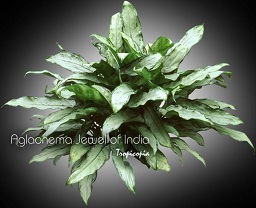Table of contents
Chinese Evergreen

Latin Name: Aglaonema ‘Jewel of India’
Category: Aglaonema
Family: Araceae
Origin: Hybrid
Climate: Tropical
Growing Zones: 11
Care Instructions
The Chinese Evergreen (Aglaonema ‘Jewel of India’) is a tropical plant that originates from Hybrid. This aglaonema plant belongs to the Araceae family and is well-suited for growing in USDA zones 11.
Complete Care Guide for Chinese Evergreen (Aglaonema ‘Jewel of India’)
Watering Requirements
The Chinese Evergreen, particularly the ‘Jewel of India’ variety, thrives with moderate watering. It is essential to allow the top inch of soil to dry out between waterings to prevent root rot, which is a common issue with this plant. During the growing season, typically spring and summer, water the plant more frequently, about once a week, ensuring that excess water drains out of the pot. In the fall and winter months, reduce watering to every two weeks, as the plant’s growth slows down. Always check the moisture level by sticking your finger into the soil; if it feels dry, it’s time to water. Remember, overwatering is more detrimental than underwatering, so err on the side of caution.
Light Conditions
Chinese Evergreens prefer bright, indirect light but can also tolerate low-light conditions, making them ideal for indoor environments. Direct sunlight can scorch their leaves, so it’s best to place them near a window with filtered light or in a well-lit room. If the leaves start to lose their vibrant color or become leggy, it may be a sign that the plant is not receiving enough light. Conversely, if the leaves develop brown tips, it may indicate too much direct sunlight. For optimal growth, aim for a balance of light that mimics their natural habitat, which is the understory of tropical forests.
Soil Preferences
The ideal soil for Chinese Evergreen is a well-draining potting mix that retains some moisture without becoming soggy. A blend of peat moss, perlite, and pine bark works well, providing the necessary aeration and drainage. It’s crucial to avoid heavy soils that can lead to water retention and root rot. Fertilization should be done during the growing season with a balanced, water-soluble fertilizer every 4-6 weeks. In the fall and winter, reduce or eliminate fertilization as the plant enters a dormant phase. Always ensure that the pot has drainage holes to prevent water accumulation at the bottom.
Pests and Diseases
Chinese Evergreens are generally resilient but can be susceptible to pests such as spider mites, mealybugs, and aphids. Regularly inspect the undersides of leaves and the stems for any signs of infestation. If you notice pests, treat the plant with insecticidal soap or neem oil, ensuring to cover all surfaces of the plant. Additionally, watch for signs of diseases like root rot, which can occur from overwatering. Symptoms include yellowing leaves and a mushy stem base. To prevent this, always allow the soil to dry out between waterings and ensure proper drainage. If root rot occurs, it may be necessary to repot the plant in fresh soil and trim away any affected roots.
Special Care Tips
To keep your Chinese Evergreen ‘Jewel of India’ thriving, consider the following special care tips: First, maintain humidity levels around the plant, as they prefer a humid environment. You can achieve this by misting the leaves regularly or placing a humidifier nearby. Additionally, wipe the leaves with a damp cloth occasionally to remove dust, which can hinder photosynthesis. If you notice the plant becoming too tall or leggy, consider pruning it back to encourage bushier growth. Lastly, be cautious of temperature fluctuations; Chinese Evergreens prefer temperatures between 65°F to 80°F (18°C to 27°C) and should be kept away from cold drafts or sudden temperature changes. With these care tips, your Chinese Evergreen will not only survive but thrive, showcasing its beautiful foliage for years to come.








